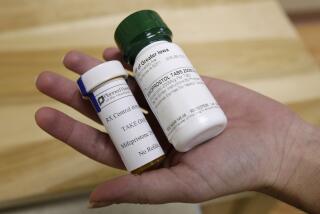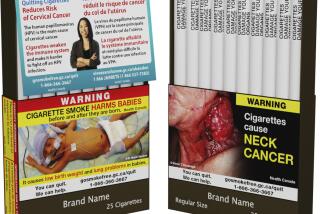Medication new to the market? Proceed with caution
- Share via
Almost a quarter of prescription medications approved for patients in Canada over a 16-year period went on to be pulled from the market or to require a strongly worded safety warning to patients, a new study says.
In a “Research Letter” published online in the Archives of Internal Medicine, University of Toronto researcher Dr. Joel Lexchin looked at the 434 drug approvals that moved through Health Canada’s drug-safety arm from the start of 1995 to the end of 2010. Canada’s drug safety agency operates much like the U.S. Food and Drug Administration, so the study may reflect the state of drug safety in the United States as well.
About a quarter of the drugs approved in that period received a “priority review”-- essentially, a fast-track deliberation. But when Canada’s drug safety agency approved a medication after such a review, the likelihood that the agency would have to take later safety action was about 50% higher than when a medication was subject to the customary deliberation period.
And more than 7 in 10 of those fast-tracked approvals were for drugs that did not even represent a “major therapeutic advance” over medications already available. When the patient population is sufficiently large or growing, drug-makers sometimes elbow their way into a profitable market by seeking expedited approval for “me-too” drugs; their drug candidates tend to mimic the effects of medications already available, but do so in subtly different ways.
Compared to medications that got full safety reviews, these fast-tracked me-too drugs had a rate of safety problems that was even more elevated.
But some drug candidates get a fast-track review because they meet an unmet need in the treatment of a serious illness. Lexchin’s analysis found that priority review medications used to treat important clinical conditions such as cancer and HIV/AIDs were no more likely to require later safety actions than the fast-tracked me-too drugs.
That was a surprise, because regulators could be expected to accept some heightened risks when approving new medications to treat serious illness. That these drugs were not, in fact, more dangerous than drugs that were not “breakthrough” treatments suggests that Canada’s drug safety agency was allowing risky drugs on the market without compensating benefits.
An accompanying editorial makes the study’s implications for patients and their physicians clear:
“Getting faster access to newer, less-thoroughly tested drugs is at best a mixed blessing,” wrote Thomas J. Moore, a researcher with the Institute for Safe Medication Practices in Pennsylvania. “For the first three years after approval, new drugs should carry a special warning akin to the black triangle used in Britain. It should be prominent and mean to every physician, ‘New Drug: Caution Indicated.’ ”
That caution may be worth remembering particularly for people intrigued by two weight-loss drugs new to the market after FDA review. You can read about them here: FDA approves another weight-loss pill, Qsymia; and FDA approves lorcaserin, first weight-loss drug since 1999: Once the Drug Enforcement Administration clears it, the drug will be marketed in the U.S. under the name Belviq. But the FDA’s approval comes with a warnin







